 Petzlover
Petzlover Estrela Mountain Dog is originated from Portugal but Scottish Deerhound is originated from United Kingdom. Estrela Mountain Dog may grow 9 cm / 3 inches shorter than Scottish Deerhound. Both Estrela Mountain Dog and Scottish Deerhound are of same weight. Estrela Mountain Dog may live 3 years more than Scottish Deerhound. Estrela Mountain Dog may have less litter size than Scottish Deerhound. Estrela Mountain Dog requires Moderate Maintenance. But Scottish Deerhound requires Low Maintenance
Estrela Mountain Dog is originated from Portugal but Scottish Deerhound is originated from United Kingdom. Estrela Mountain Dog may grow 9 cm / 3 inches shorter than Scottish Deerhound. Both Estrela Mountain Dog and Scottish Deerhound are of same weight. Estrela Mountain Dog may live 3 years more than Scottish Deerhound. Estrela Mountain Dog may have less litter size than Scottish Deerhound. Estrela Mountain Dog requires Moderate Maintenance. But Scottish Deerhound requires Low Maintenance
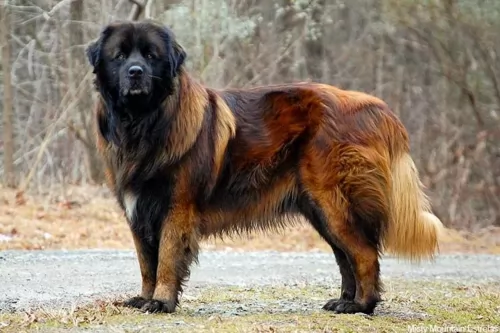 Also known as the Cao da Serra de Estrela, the large Estrela Mountain Dog from Portugal is an ancient breed, having been used for centuries to guard homesteads and livestock.
Also known as the Cao da Serra de Estrela, the large Estrela Mountain Dog from Portugal is an ancient breed, having been used for centuries to guard homesteads and livestock.
The Estrela, as a herding dog, has been developed over a long period of time because shepherds particularly wanted a dog that could survive in the mountains and be strong enough to guard livestock from predators.
The first official recorded breed standard was published in 1933, with an attempt to make the Estrela a distinct breed with a hooked tail and double dew claws.
Today the Estrela is a dog which can be found in other countries beyond Portugal, and in fact in 1973 pairs of the dogs were imported to the United States.
 The Scottish Deerhound is considered the Royal Dog of Scotland. It is a sighthound that is large and bred to hunt large Red Deer. They are similar in appearance to the Greyhound, but they are bigger and heavier. Closely related to the Irish Wolfhound, they were used in creating it. The Scottish Deerhound is an ancient breed that is now very rare. It can trace its lineage to the 16th and 17th centuries.
The Scottish Deerhound is considered the Royal Dog of Scotland. It is a sighthound that is large and bred to hunt large Red Deer. They are similar in appearance to the Greyhound, but they are bigger and heavier. Closely related to the Irish Wolfhound, they were used in creating it. The Scottish Deerhound is an ancient breed that is now very rare. It can trace its lineage to the 16th and 17th centuries.
The Deerhound was a favorite of hunting nobility and could not be kept by any person or household that did not have at least the rank of earl. Despite this history the Scottish Deerhound was not considered separate from the Highland Greyhound and other staghounds until the 19th century. They were bred to stalk or “course” the red deer and were used extensively for this purpose until the beginning of the 20th century. At that time there was a need for smaller, slower deer tracking dogs.
At the start of the 20th century, the land for deer hunting had grown smaller and so had the deer. Also, the invention of the rifle made the fast Deerhounds who could cover large tracks of ground in minutes, no longer a necessity for successful hunting. As the clan systems fell and the nobility rose, the Deerhounds became the dog for nobility and landowners. There were a few non-nobilities who also kept them and hunted with them. As they were less needed for hunting a few households kept them as show dogs.
In the United States and Canada, both the Scottish Deerhound and the Greyhound were used for hunting wolves and deer. In Australia, the Kangaroo Dog – a deerhound crossbreed, and Deerhounds were used to hunt wild boar, emu and kangaroos. The Deerhound is one of the oldest of the breeds that are Greyhound-like. The Deerhound is not as fast as the Greyhound if they are running on a smooth surface. Get them on a rough surface and the will out that Greyhound. They appear to be larger and rougher than they really are. This gives them an advantage over the lighter, smaller Greyhound.
The Deerhound was a contributor to development of the Irish Wolfhound toward the end of the 19th century.
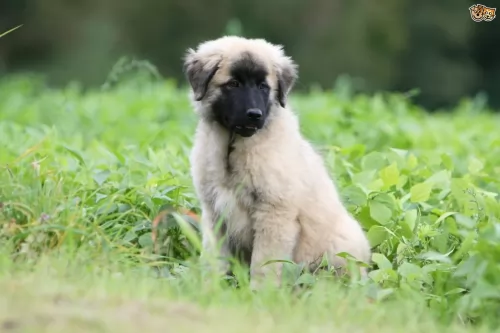 The large Estrela Mountain Dog stands between 62 and 72cm and weighs between 30kg and 50kg.
The large Estrela Mountain Dog stands between 62 and 72cm and weighs between 30kg and 50kg.
The dog has 2 coat types – short and long but always coarse and thick. The coat is available in a number of colors, from fawn to gray to yellow and brindle and there can be white and black mixed throughout the coat.
The head of the dog is large and long, the neck fairly short and thick, he has dark brown eyes, a bright, intelligent expression with small, floppy ears which are set high on the skull, falling backwards against the side of the head. The tail is long and thick and the dog has a deep chest.
A large, athletic dog, the Estrela Mountain Dog is actually a calm dog, while still being protective towards his human family.
He is an intelligent dog who responds well to training and socialization. He is an independent dog, so this training and socialization is important - will be good for him, turning him into an obedient, relaxed pet who gets on well with other pets in the home as well as with children.
 The Scottish Deerhound looks a lot like the Greyhound, except it is heavily boned and larger in size. The Deerhound is also different in several other ways. Instead of the Greyhound, the Scottish Deerhound is more closely related to the Irish Wolfhound than the Deerhound. The Deerhound is a large, rough coated breed. It is a very tall breed; in fact, it is the tallest of all sighthounds.
The Scottish Deerhound looks a lot like the Greyhound, except it is heavily boned and larger in size. The Deerhound is also different in several other ways. Instead of the Greyhound, the Scottish Deerhound is more closely related to the Irish Wolfhound than the Deerhound. The Deerhound is a large, rough coated breed. It is a very tall breed; in fact, it is the tallest of all sighthounds.
The Deerhound has a long head with a flat skull and a muzzle that tapers at the end. They have dark eyes and a scissor bite with a tail that can be either curved or straight. The hair on their tails almost touches the ground. The rest of its coat is wiry and harsh with a beard, mustache and mane. The ears are soft and can be either held semi erect or folded against their head. Their coat is gray or grey-blue today but in the past, it might have been brindle, red fawn or yellow.
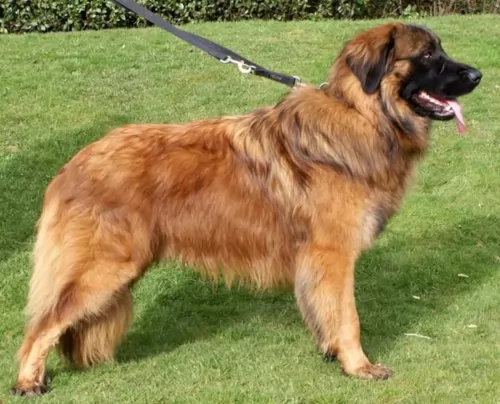 The Estrela Mountain Dog loves his human family and takes guarding them and protecting them seriously. He is a strong willed, independent dog that will require training and socialization. He makes an excellent pet, and is calm and gentle with children.
The Estrela Mountain Dog loves his human family and takes guarding them and protecting them seriously. He is a strong willed, independent dog that will require training and socialization. He makes an excellent pet, and is calm and gentle with children.
The Estrela Mountain Dog has so much going for him – he is beautiful to look at, he is loyal and protective with his human family, he is intelligent, loving and a healthy type of breed, and he is just waiting to become a member of your family.
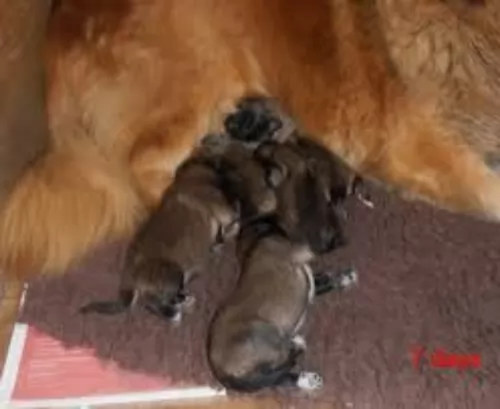 The Estrela Mountain Dog can live to be between 10 and 14 years of age, but as with any large dog, he will have a tendency to suffer from hip- and elbow dysplasia.
The Estrela Mountain Dog can live to be between 10 and 14 years of age, but as with any large dog, he will have a tendency to suffer from hip- and elbow dysplasia.
Dilated cardiomyopathy is another common heart failure disease found particularly in large-breed dogs. The Estrela is prone to this disease and you’ll notice he has shortness of breath, abdominal swelling and coughing. The disease may not be curable, but there are certainly treatments for it.
 The Scottish Deerhound does face some serious challenges on the health front. These include:
The Scottish Deerhound does face some serious challenges on the health front. These include:
• Cystinuria – recessive disorder that causes an inability for cystine to be filtered from the urine.
• Gastric Dilatation Volvulus – otherwise known as bloat and it can be life threatening if not treated quickly.
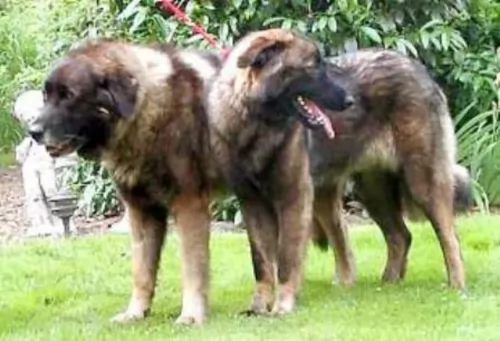 The Estrela Mountain Dog is a large dog and thankfully, when it comes to feeding him, experts in dog feeding have come up with commercially manufactured dog feeds that particularly cater for a dog’s age, his size and any illnesses he may have.
The Estrela Mountain Dog is a large dog and thankfully, when it comes to feeding him, experts in dog feeding have come up with commercially manufactured dog feeds that particularly cater for a dog’s age, his size and any illnesses he may have.
As a large dog, your Estrela Mountain Dog can suffer with joint problems such as hip dysplasia. For hip dysplasia you want to be looking at a dog food for large dogs which contains joint-health ingredients. An ingredient in the dog food such as glucosamine can work to reduce the damage brought about by hip dysplasia.
Mix in some cooked brown rice, vegetables and chicken into his kibble from time to time. You want your pet to live a long, healthy life and raw meat added in occasionally can increase your pets energy levels, reduce the risk of joint disease and ensure a shiny, soft coat. Raw meat can provide iron, zinc, vitamins, minerals and potassium.
The Estrela isn’t a huge shedder, but his beautiful, thick coat will require brushing twice a week. It’s your chance to check him over for fleas and ticks as well, and the entire grooming process – checking his ears, nails and teeth – is an excellent bonding experience for you and your canine friend.
The Estrela may be large, but he is fairly calm. He’ll love to join you on your daily walks or for a ball game in the garden. He can adapt to life in the city or the country, but his big size will mean he isn’t suited to a tiny property.
 1.Feeding the puppy – Feed a high quality large or x large puppy dogfood at least 3-4 times a day. Do not overfeed.
1.Feeding the puppy – Feed a high quality large or x large puppy dogfood at least 3-4 times a day. Do not overfeed.
2.Feeding the adult – Feed a high-quality adult large or x large dog food once or twice a day. Do not overfeed.
4. Games and Exercises – The Deerhound needs plenty of exercise in a safe place where they have plenty of room to run. A small yard or life on a leash are not enough for this energetic breed. Play fetch, course running, Like the Greyhound they will be couch potatoes if you let them but that will hurt their health. Lure Coursing or hare coursing are good. Coyote hunting. Find space where they can run for the joy of running. Never force them to run – like along a bicycle